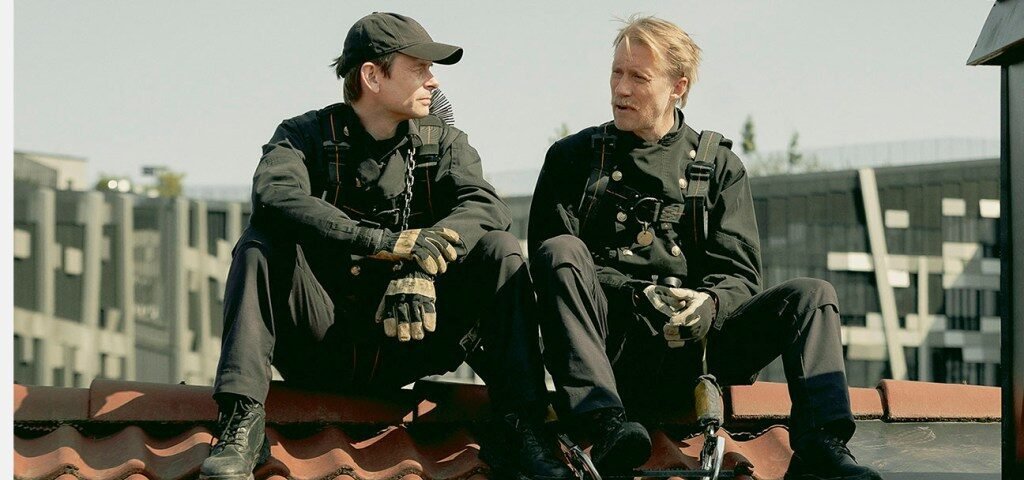


‘Pepe’ Review: A Footnote in the Pablo Escobar Saga Is Dreamily Reimagined as a Hippo’s Reflections on Life and Death
March 1, 2024


‘My New Friends’ Review: Isabelle Huppert Headlines Andre Techine’s Unconvincing Social Drama
March 2, 2024Dag Johan Haugerud’s candid look at constricting gender roles centers on two friends spurred by different experiences to readjust their sense of self.
Sex
Chimneys will be swept.
Had your fill of punishing investigations into toxic masculinity? Then the thoughtful questioning, sensitivity, low-key humor and refreshing candor of Norwegian director Dag Johan Haugerud’s Sex might be your antidote. Turning the male character study on its head with a gentle subversiveness that recalls what The Worst Person in the World did with romantic comedy, this superbly acted drama’s refusal to serve up tidy epiphanies might leave you wanting more. But the inchoate nature of the central characters’ self-reflection is partly the point in a smart movie with a lot on its mind.
While the predominant structure as a series of intimate, often extended two-character conversations full of sharp dialogue means Sex could almost work as a play, the film is also crisply cinematic. When not locked in tight scrutiny of the characters, DP Cecilie Semec’s camera hangs back to take in the bustle and severity of the city, with its tower blocks, construction sites and traffic snarls. Climbing up on a roof to clean a chimney can either broaden a person’s view or compound their isolation.
Sitting at an office breakroom table with cars streaming by on a freeway through the window behind him, the company supervisor (Thorbjorn Harr) recounts a vividly detailed dream that caused him to wake in discomfort. A figure that he first thought might be God or Frida from Abba turns out to be David Bowie, who shares some basic tenets about the human capacity to recognize goodness and beauty on the plus side and injustice and evil on the negative. But what really stayed with him from the dream was the awareness that Bowie was looking at him as a woman.
When the frame eventually shifts to reveal his employee (Jan Gunnar Roise), there’s some dry amusement in the discovery that the supervisor isn’t even a Bowie fan. But the director never makes fun of the openness and honesty in these two men’s conversations, which are the heart of the film.
Even at their morning pool appointments to swim laps with a larger group, there’s no trace of “bro” bravado or awkwardness. Nor is there even the faintest whiff of gay panic when an out-of-the-blue disclosure causes the supervisor to look at his friend and colleague in a different light. Whether this is realistic or wish fulfillment is unimportant. All that matters is that it’s credible in the central relationship depicted here and the nuanced performances of both actors.
He also shares that he went home and told his wife of 20 years (Siri Forberg), maintaining that he doesn’t regard the interlude as cheating because there’s no hiding or lying involved. She doesn’t quite see it that way, and while there are no hysterical arguments about infidelity, she can’t let it go the next day when he just wants to talk about plans for the garden or take their sons to dinner at Ikea. When she worries he might be gay, he says, “Having one beer doesn’t make me an alcoholic.”
One of the key parts of the experience is the husband’s admission that he was turned on by having a man look at him that way. Among the film’s more oddly touching impressions is that men want to feel desired, not in any swaggering horndog way but certainly in ways that don’t fit neatly into the boilerplate mold of husband and father. Still, he feels bad about the pain he caused his wife and assures her he has no intention of doing it again.
Meanwhile, the supervisor, who sings with a choir, is puzzled by a shift in his voice, sounding slightly higher and a little constricted. The group’s orchestra leader recommends a vocal coach (Nasrin Khusrawi), who helps loosen up his tongue, telling him the problem is likely in his head and stress-related. The Bowie dream becomes a recurring part of his sleep, but rather than waking up feeling uneasy, he begins to take pleasure in the sensation of being looked at as a woman.





